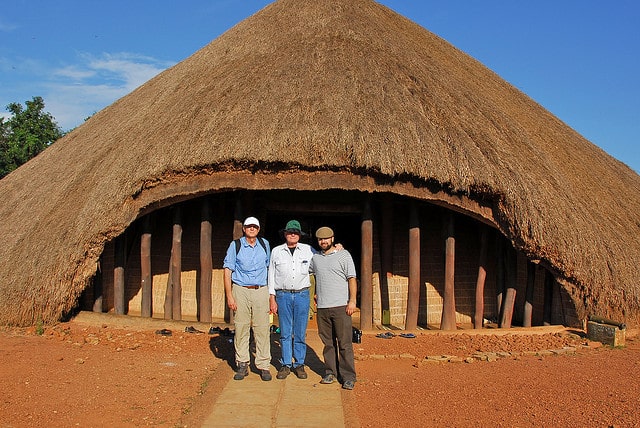The Bagisu and their culture
The Bagisu- have no tradition of an early migration from somewhere. They assert that their ancestors were called Mundu and Sera whom tradition says came out of a hole in Mountain Masaba. Their early life seems to have been anti-social, almost based on the principle “survival of the fittest”. Very little is so far known about their history but they are known to be related to a sub-group of the Luhya of Kenya known as the Bukusu. The Bagisu are believed to have separated from the Bukusu sometime in the 19th century.
The tradition claiming that they have always lived where they are throughout history is not fashionable. The earliest immigrants into Bugisu area are believed to have moved into the Mt. Elgon area during the 16th century from the eastern plains. Their earliest home is said to have been in the Uasin Gishu plateau of Kenya. They seem to have been an end product of the mixing of peoples of different origins and cultures, but since their language is Bantu, their predecessors should have been Bantu speakers as well.
Detailed visit to The Bagisu and their culture
Origins and History
The Bagisu people do not have a clear tradition of early migration. According to their beliefs, their ancestors emerged from a hole in Mount Masaba. They are said to be related to the Bukusu sub-group of the Luhya people in Kenya. It is believed that the Bagisu separated from the Bukusu in the 19th century. While they claim to have always lived in their current location, historical evidence suggests that they migrated to the Mt. Elgon area in the 16th century from the eastern plains.
Circumcision Rituals
Circumcision is a significant aspect of Bagisu culture. The origin of this practice is uncertain, even among the Bagisu themselves. There are different stories explaining its beginnings, including demands from the Banpa (Kalenjin) people, a surgical operation to save a man’s life, or as punishment for seducing other people’s wives. Circumcision among the Bagisu occurs biannually during leap years, and it is compulsory for every male to undergo the ritual upon reaching puberty. Those who try to evade the ceremony are pursued and forcibly circumcised. Before the actual circumcision, initiates are administered a herb called ityanyi to stimulate their interest in the ritual.
 Initiation and Post-Circumcision
Initiation and Post-Circumcision
During the initiation process, the initiates walk and dance around the villages for three days, while their heads are sprinkled with cassava flour and painted with malwa-yeast paste. After the circumcision, the initiate is wrapped in a piece of cloth and taken to his father’s house. For three days, he is not allowed to eat with his hands and is fed by others. After this period, a ritual is performed to wash the initiate’s hands, and he is then considered a man. Customarily, this is the point when he is eligible for marriage. The healing process of the circumcision cuts is believed to depend on the number of goats that have been slaughtered during the ceremony.
Iremba Ritual
After healing, a ritual called Iremba takes place, which is attended by all the new initiates in the locality. During this ceremony, the initiates are allowed to choose a girl to have sexual intercourse with, and the girl is not supposed to refuse. It is believed that if she refuses, she may have difficulties having children in the future. In the past, circumcision was performed in specific enclosures, but nowadays, the entire process is open for the public to observe.
Imbalu Circumcision Ceremonies
The Bagisu hold public Imbalu Circumcision Ceremonies, which provide an opportunity to witness and understand their cultural traditions. These ceremonies are important occasions attended not only by the local villagers but also by government officials and visitors. The ceremonies offer a glimpse into the Bagisu culture and can be a fascinating experience during a Uganda safari.
Traditional marriage among the Bagisu facing extinction
According to history, the girls around the ages of 12 years began the process of scarring their faces and would cut the skin of their foreheads and rub ash into the wounds.
“The product of such actions being ornate keloids; women would never be allowed to marry if they had not gone through this and traditionally, this was a sign of clan membership and no boy would be allowed to marry from his own clan as this was considered abominable,” said Umukukha Mushikori.
Acceptance of the proposal
When the father of the boy’s proposal was accepted by the father of the bride-to-be, then the former would go back and prepare when to go back.The father of the boy would then select a person to act as a mediator between the side of the boy and that of the girl who did the negotiations for bride price before.
Tour Inclusives
- Transportation in a tourist vehicle with pop up roof
- Services of the English speaking guide
- All activities are described in the itinerary.
- Park entrance fee is according to the program.
- Drinking water
Tour Excludes
- Personal Expenses like tobacco, telephone, drinks, laundry, porter fee
- Personal insurance
- Visa
- Beverages





